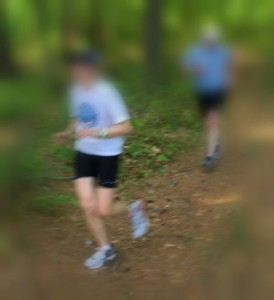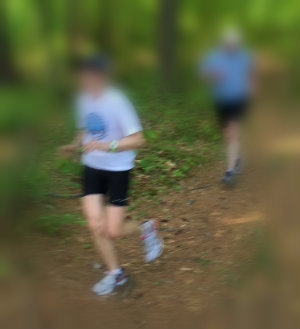Building a support network as a new runner
 Who should you know? Who should you trust?
Who should you know? Who should you trust?
It’s all about who you know and the relationships you build in life, right? If you want to start running the same holds true. Most of us have to learn these lessons through trial and error as we navigate the waters of a new sport. But there is a helpful team you can start building to be your guides and pilots through the stormier channels.
They say if you want to start a business you need to find an accountant and a lawyer that are not only competent, but that you can trust. Who are the equivalent resources for running?
Build a support crew from the people in your life already
I’m going to start close at home. Start with the support, or lack of support, team that you live and work and play with. Begin to build a network of likeminded individuals to share your journey with. And, unfortunately, be prepared to build defenses against those who will try to get you to stop.
Who are these people? They are first and foremost your direct family. When you finally reach that point that you want to start running as a lifestyle choice, you’re going to by necessity have to let your family in on the secret.
They may or may not be supportive. But you have to try. It may be a great shared experience where your spouse and your kids all celebrate the birth of a new you, and if that’s the case look for ways to include them in your journey as either direct participants or cheerleaders.
There is nothing better than having a loved one cheering you from the crowd or offering a hug at the 20 mile mark.
On the other end of the spectrum they may see your decision to start running as an indictment of their own lifestyle or an attack on the status quo. They may manifest in the traditional “You’ll wreck your knees, you’ll freeze your lungs and you’ll give yourself a heart attack!” comments.
Or you may get the more insidious passive aggressive strategies. Like making sure you have to choose between your favorite meal and a work out. Or proactively setting up conflicts between what you’re trying to do and the family. “Oh, you have a long run Sunday? Little Jimmy has a horse riding appointment, but I understand if you don’t have time…”
It’s worth some investment in the beginning to take the temperature of your family and work mates to make sure you know where they stand and to let them know that your running is not a comment on their lifestyle.
Find some likeminded runners
The second, more direct support system that you should seek out is co-conspirators and mentors. These don’t have to be coaches, but can be. The best place to find these fellow running enthusiasts are at your local running club or in one of the online running forums.
Be careful of who you choose to run with initially because you need to find folks who match your current capabilities. When you’re just starting it can be a bit off-putting to show up for a group run and hammered by the veterans. They’re not being mean to you, that’s just where they’re at in their capabilities and it’s not fun for them to slow down for you.
But spend time with those veterans because they have a lot of knowledge to drop about training and racing. Their enthusiasm and anything-is-possible attitude will help you along your journey. Misery loves company so be wary if they start trying to talk you into races or events you’re not ready for yet!
Find a good Massage Therapist and/or Physical Therapist
At some point your body will start to break down and you’ll get aches and pains. Chances are there’s nothing really serious but since you’re new you won’t know what the difference is.
A good Massage therapist will be able to reach into your body with their fingers and diagnose the problem. It’s not just about making you feel better, it’s about telling you specifically what bits are out of which and why. They should be able to show you pictures of that tendon or muscle and how it works. This is important because you can visualize the mechanics of your own body and learn how to adjust.
I’ve never had much luck with physical therapist, but good ones know how the body works and can show you how to move in such a way as to support the running.
The other thing about these professionals is that some of them have an actual ‘healing touch’ that goes beyond the mechanical. When you make a connection with a good therapist the two of you essentially join in healing. It’s a powerful and helpful relationship.
Sports Medicine Doctor
In today’s world of specialization you may need a number of doctors for different parts of your body. Knee specialist don’t do ankles. Take time and be very careful when selecting your caregivers.
Most general practitioners will tell you to stop running and give you some anti-inflammatory. You want a specialist who is used to treating athletes, who understands the needs, wants and dreams of athletes.
The traditional doctor training is to ‘fix’ you. You want more. You want to know how you got broken in the first place and how to change your approach to prevent it in the future.
If they want to give you pills and splints and other prophylaxes that really just mask the symptoms you want to shy away. You want to go deeper. It’s your body. Take control of your medical care and get real answers. Don’t let the medical bureaucracy bully you.
The best way to find these care givers is to ask the other runners. When the same doctor name comes up more than once you know you’ve found a potential keeper.
Nutrition Coach
I usually tell new runners not to try to ‘diet’ at the same time they are trying to establish a running routine. It’s just too much stress. But as you start to feel your body and listen to your body you start to think of food as fuel.
There is so much crazy misinformation around nutrition. It’s hard to find a clear path through the junk pile. A nutrition coach can help you. Not one of the big diet companies. Not nayone who is selling meals or shakes or exercise programs. You want a person who is an athlete, who understands nutrition and who is willing to help you.
You may have to pay them but you may be able to find like-minded individuals who just want to share their journey.
Running Coach
Once you get started you’ll need advice. There is lots of advice out there. Not all of it good. You can start with one of the many kind-hearted practitioners, many of whom would love an opportunity to mentor a new runner.
Look for someone who you can talk to. Someone you can share openly with. The advantage of having a coach, or even a sponsor, is not so much that they will tell you what to do. The advantage is that you gain a sounding board for you thoughts and concerns and doubts. They help you work through the challenges. They share your burden.
As you become more advanced you may set your goal on a race. This is where a coach will shine. A good coach can assess your capabilities and come up with a training plan for you that fits your goals. The problem with pulling a plan from a book or website is that the plan is an average plan and you are not average, you are unique.
The input and guidance of an actual concerned human in your running can make a big difference.
The A team
The time to start looking for and building this support team is when you start. If you wait until you need them it’s too late. Getting ahead of the curve can save you many misadventures.

